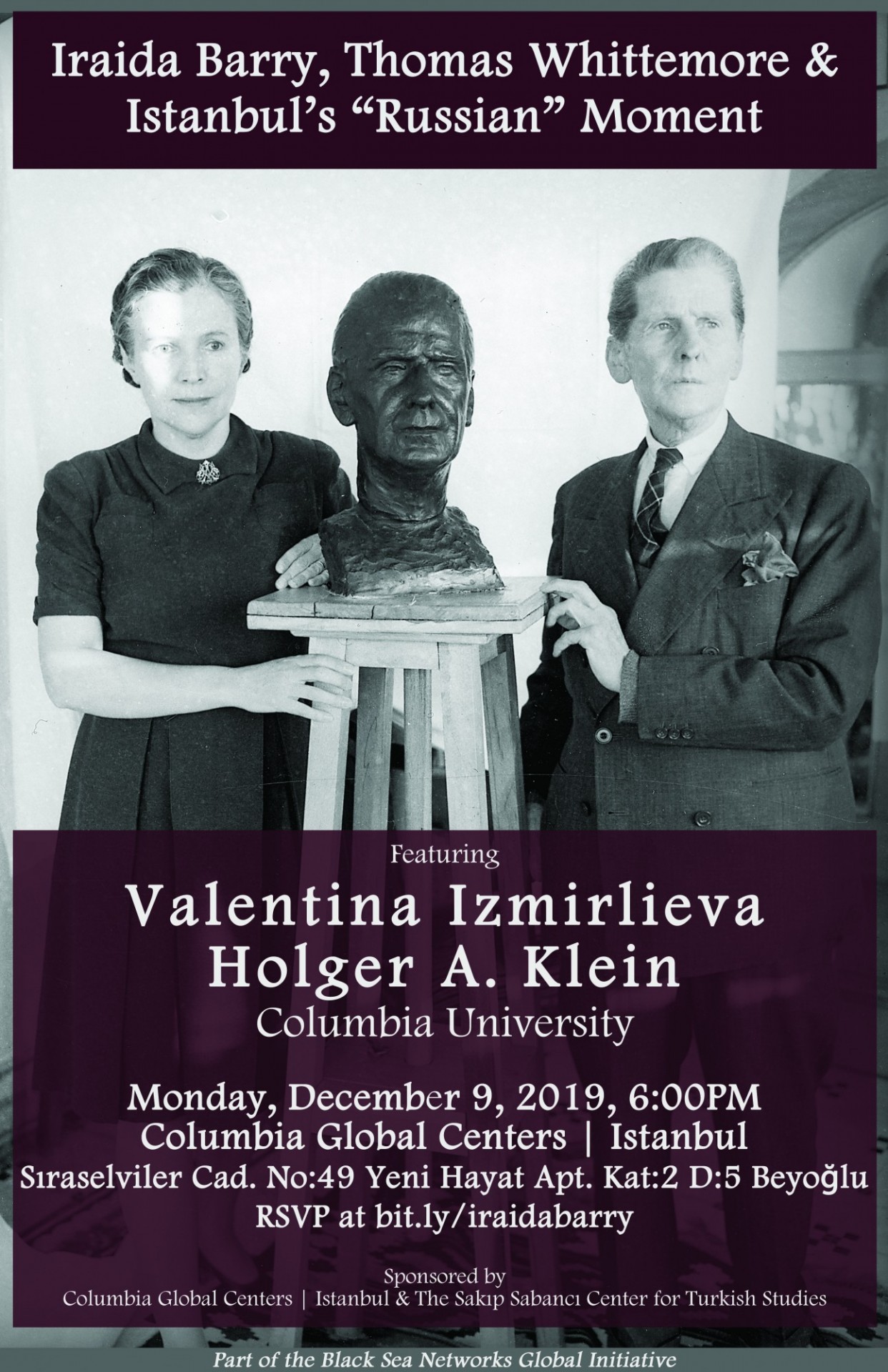Please note that this event takes place in Istanbul, Turkey, at Columbia Global Centers | Istanbul.
A lecture on "Iraida Barry, Thomas Whittemore & Constantinople’s “Russian” Moment" by Professors Valentina Izmirlieva & Holger A. Klein.
Few cities in the world have fascinated the Russian political imagination more than Constantinople/Istanbul. For centuries, the Russians called it “The City of the Tsar” (Tsargrad) and began to dream of reclaiming it for Eastern Christianity as soon as it fell to the Ottomans in 1453. During the First World War, the dream of a “Russian Constantinople” came deceptively close to becoming a reality, but the year 1920 crushed it with a dramatic and poignant twist. This lecture explores the brief yet consequential moment when Constantinople became almost “Russian,” in a rather unexpected conclusion to the age-old conflict between the Ottoman and Russian empires.
Surprisingly, the city of Constantinople/Istanbul’s importance for the dispersion of Russian ideas and culture in the 1920s has been unduly overlooked in Russian historiography. Similarly, the role of the Russian refugees in the history of modern Constantinople has yet to receive the serious scholarly reflection it deserves. By opening a conversation on these concerns, our lecture pushes against both customary narratives of Istanbul’s “Russian” moment and traditional models for making sense of forced migration as a global experience, past and present. We will focus on two fascinating personalities, the Russian-born sculptor Iraida Barry and the American philanthropist Thomas Whittemore, founder of the Byzantine Institute of America, whose lives—each in its own way—were transformed during Constantinople’s “Russian” moment, reflecting the transformations of the city itself.
This event is sponsored by The Columbia Global Centers | Istanbul and The Sakıp Sabancı Center for Turkish Studies.
Valentina Izmirlieva is a historian of Balkan and Russian religious cultures. She holds an appointment as Professor of Slavic Literatures and Cultures at Columbia University, where she has taught since 1999. Much of her work addresses cultural exchanges among Christians, Jews, and Muslims in the context of multi-ethnic, multi-religious empires and their successor states. She is the author of All the Names of the Lord: Lists, Mysticism and Magic (University of Chicago, 2008) and co-editor (with Boris Gasparov) of the volume Translation and Tradition in Slavia Orthodoxa (Lit Verlag, 2012). In 2012-13, she was the Andrew W. Mellon Foundation Fellow at the Cullman Center for Scholars and Writers of the New York Public Library. Currently, she is working on a monograph about the Christian Hajjis of the Ottoman empire and leads the global initiative “Black Sea Networks,” the recipient of a President’s Global Innovation Fund grant for 2016-2018.
Holger A. Klein is the Lisa and Bernard Selz Professor of Medieval Art History in the Department of Art History and Archaeology at Columbia University. He has served as Director of Art Humanities, Director of Graduate Studies, and Department Chair. From 2004 to 2007 he held an appointment as the Robert P. Bergman Curator of Medieval Art at the Cleveland Museum of Art. His work as a curator includes various international loan exhibitions, among them Restoring Byzantium. The Kariye Camii in Istanbul and the Byzantine Institute Restoration (2004), Bir Anıt – Iki Anıtsal Kişilik: Theodoros Methokites’den Thomas Whittemore’a (2007), and Treasures of Heaven. Saints, Relics and Devotion in Medieval Europe (2010–11).
He is the recipient of several awards and prizes, including the 50th annual Mark Van Doren Award for Teaching (2011), the Lenfest Distinguished Faculty Award (2012), and the Wm. Theodore de Bary Award for Distinguished Service to the Core Curriculum (2014). He held the Alliance Visiting Professorship at the Université Paris I, Panthéon-Sorbonne (2015–16) and currently serves as Director of Columbia University’s Sakıp Sabancı Center for Turkish Studies and Faculty Director of Columbia’s emerging Center for Venetian Studies at Casa Muraro in Venice.
His research focuses on the history and historiography of Late Antique, Early Medieval, and Byzantine art and architecture, including the history of objects, the cult of relics, and issues of cultural and artistic transfer and exchange.

